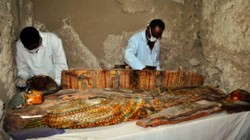 The ancient Egyptians and their modern counterparts have less in common than previously thought. That is, at least genetically, reported a team of scientists. Researchers from the University of tц?bingen and the Institute for science of humanity at the max Planck in Jena, for the first time decoded the genome of the ancient Egyptians with surprising results. The ancient Egyptians and their modern counterparts have less in common than previously thought. That is, at least genetically, reported a team of scientists. Researchers from the University of tц?bingen and the Institute for science of humanity at the max Planck in Jena, for the first time decoded the genome of the ancient Egyptians with surprising results.
The study is published in Nature Communications showed that the preserved remains discovered in Abusir-El-Melek, middle Egypt, are the closest genetic relatives of the population of the Neolithic and bronze in the Middle East. In the end, scientists came to the conclusion that the inhabitants of Ancient Egypt were genotype close to that of the current residents of Syria, Iraq, Turkey, Jordan, Lebanon and Israel.
The conclusions were turning theories, forcing Egyptologists to reconsider the history of the region, opening new puzzles for scientists working in this area. Retrieves information about the genome is a new frontier for Egyptologists. Researchers took bone samples from 166 151 mummies Dating from about 1400 Analyzing samples spanning millennia, the researchers looked for genetic differences compared to modern Egyptians. They found that a set of samples showed a strong link with the cluster of ancient, not African populations, located to the East of the Mediterranean sea.
Although the study may be limited in scope, the team believes that I made some technical breakthroughs. Scientists say that the genes of the inhabitants of Central and southern Africa, the Egyptians began to manifest itself only starting from the IV-V centuries of our era. Until then, however, the genotype of the Egyptians remained virtually unchanged.
sections: Society, World News
|